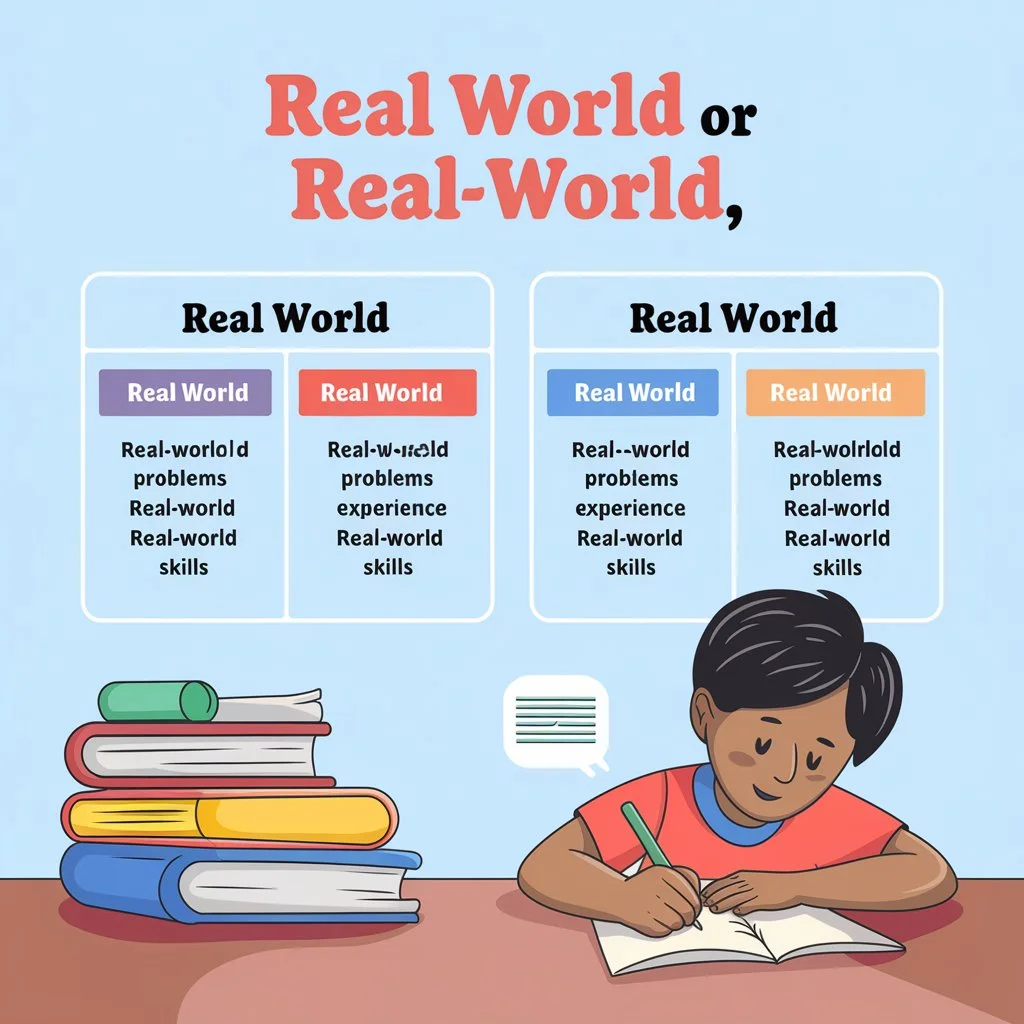Today, we’re exploring whether to use “real world” or “real-world” and answering a simple question: Is real world hyphenated? Understanding when to hyphenate phrases like “real-world” can feel confusing at first, but mastering this rule is simpler than it seems.
Hyphen rules can be confusing, but they don’t have to be. Once you learn the rules for one word, you’ll find that they apply to all words in similar contexts.
The use of hyphens often depends on whether the phrase functions as a modifier or a noun. In writing, we hyphenate “real-world” when it modifies a noun and leave it unhyphenated as “real world” when it stands alone. Mastering this difference will help you write more clearly and avoid common grammar mistakes. Let’s explore this further with frequently asked questions and clarify how to use real world and real-world correctly.
Real World Or Real-World – Hyphenated Or Not?
The real world hyphen rule shows us that “real-world” is hyphenated when used as an adjective to modify a noun or object in a sentence. However, “real world” remains unhyphenated when it functions as a noun phrase and is not modifying anything else in the sentence.
Examples Of When To Use “Real World”
Now that we’ve covered the basics of real world vs. real-world, it’s time to explore how to use real-world examples (see what we did there?). We’ll start with “real world” as two words without the hyphen. It is used in this form when functioning as a noun phrase and not modifying another noun in the sentence. Let’s demonstrate to make this clearer.
- They don’t do that in the real world.
- Wake up, Danny. This is the real world.
- You always talk about the real world.
- Why do I have to make friends in the real world when the internet is perfectly fine?
- Can you give me ideas that work in the real world?
- They don’t do that in the real world.
- You need to learn how things work in the real world.
- He struggles to adapt to the real world after graduation.
- In the real world, things don’t always go as planned.
- The skills you learn in school are useful, but the real world is different.
- Many people find it hard to balance online life with the real world.
- I’ve heard people say that the real world is much tougher than school.
- You’ll face many challenges in the real world, so be prepared.
- It’s time to leave your dreams behind and face the real world.
- Moving out of your parents’ house is your first step into the real world.
- The real world is not as simple as the theories we learn in class.
- He wasn’t ready for the responsibilities of the real world.
- We often forget how harsh the real world can be until we experience it ourselves.
- Many students are nervous about entering the real world after college.
- You can’t rely on textbooks to help you navigate the real world.
Examples Of When To Use “Real-World”
The hyphenated version, “real-world,” is much more common in English because it is frequently used as an adjective. When it modifies a noun or object in the sentence, it must be hyphenated. Here are some examples that show how “real-world” works as a modifier:
- This is a real-world example.
- I need some real-world experience.
- Where are your real-world friends?
- Is this a real-world scenario?
- We are real-world people.
- This is a real-world problem that we must solve.
- She needs more real-world experience to advance in her career.
- The company values employees with real-world skills.
- This simulation is based on real-world data.
- He lacks real-world knowledge of how the industry works.
- We’re discussing real-world examples in today’s class.
- The book offers practical solutions to real-world challenges.
- She gave a real-world demonstration of how the new software works.
- This project will give you a real-world perspective on business management.
- They faced several real-world obstacles while developing the product.
- His real-world approach helped the team achieve better results.
- The course includes real-world case studies for better learning.
- The documentary offers a real-world view of life in rural areas.
- These real-world strategies can help improve your financial situation.
- A real-world application of this theory would be in urban planning.
Is Real World Hyphenated In AP Style?
Understanding the difference between real world and real-world in AP style is straightforward. The AP Stylebook provides clear guidelines: hyphenate the two words when used to modify a noun (as previously discussed), but leave them unhyphenated when used as a noun phrase by itself.
Should I Capitalize “World” In The Word “Real-World”?
When combining title capitalization and hyphen rules, things can seem confusing at first. However, the solution is simple: capitalization depends on the title style you are following. There are three main styles used in writing, and you can choose whichever suits your needs:
- First Word and Proper Nouns Capitalized: In this style, you would not capitalize “world” in “real-world” because it is treated as part of the same word.
- Major Words Capitalized: Here, you would capitalize “real” but leave “world” uncapitalized since it’s part of a hyphenated compound word.
- All Words Capitalized: In this style, you would capitalize both “real” and “world” in “Real-World”, treating them as two separate words.
Alternatives To “Real World”
If the real world hyphen rule feels tricky, consider using some alternatives that convey the same meaning. Here are some synonyms for “real world” that you can use instead:
- Authentic
- Bonafide
- Actuality
- Material
- Reality
Quiz – Real World Or Real-World?
Let’s wrap up with a quick quiz to test your understanding. There is a right and wrong answer for each question, so be careful! Pay attention to whether the phrase is acting as a noun or adjective, and decide if it should be hyphenated or not.
- This is a (A. real world / B. real-world) problem.
- We are all part of the (A. real world / B. real-world).
- I need to find some (A. real world / B. real-world) friends, so my mom stops complaining about my online ones.
- We’re all comfortable with the happenings in the (A. real world / B. real-world).
- I need some (A. real world / B. real-world) examples.
Quiz Answers
- B
- A
- B
- A
- B
This should help clarify how to use real world and real-world effectively!
FAQs
When should I use “real-world” with a hyphen?
You should use “real-world” with a hyphen when the phrase is functioning as an adjective to describe or modify a noun. For example, in the sentence, “She gained real-world experience at her job,” the hyphen shows that “real-world” modifies the noun “experience.” Using the hyphen here makes it clear that the two words are working together to describe a single concept. In general, the hyphen is needed whenever the phrase is directly attached to a noun.
When do I use “real world” without a hyphen?
The phrase “real world” should be used without a hyphen when it functions as a noun phrase by itself. For example, in the sentence, “He doesn’t understand how things work in the real world,” the phrase stands alone and isn’t describing or modifying anything else. In this case, no hyphen is necessary because the phrase simply refers to reality, and it’s not functioning as a modifier.
How do I know when a phrase like “real-world” should be hyphenated?
A good rule of thumb is to check whether the phrase is modifying a noun. If it is, the phrase will likely need a hyphen to show that it is functioning as a compound adjective. For instance, in “This is a real-world problem,” the hyphen helps clarify that the problem relates specifically to the real world. When the phrase stands on its own without modifying a noun, like “in the real world,” there’s no need for a hyphen.
Is “real-world” hyphenated in all writing styles, like AP or Chicago?
Both the AP Stylebook and the Chicago Manual of Style agree on hyphenating “real-world” when it is used as a modifier. However, when the phrase is a noun standing alone, it is left unhyphenated. This consistency across different styles makes it easier to apply the rule. Whether you’re writing for a formal publication or casual use, the hyphen rules for “real-world” remain the same.
Can “real-world” be capitalized differently in titles?
Yes, the capitalization of “real-world” depends on the title style you’re using. In most title styles, like sentence case or title case, only the first word is capitalized unless you’re using a style that requires capitalizing all words. For instance, in sentence case, you would write “Real-world Problems.” In title case, you would write “Real-World Problems.” Always follow the rules of the style guide you’re using for capitalization.
Are there any alternatives to the phrase “real-world”?
Yes, there are several alternatives to using “real-world” that can convey the same meaning. Phrases like “authentic,” “genuine,” or “bona fide” can replace “real-world” when appropriate. For example, you might say, “She has gained authentic experience,” or “He is dealing with a genuine issue.” Using these alternatives can help you avoid overusing “real-world” and can add variety to your writing.
Conclusion
In summary, understanding when to hyphenate “real-world” versus when to leave it as “real world” is a matter of knowing whether the phrase is functioning as a modifier or a noun. Using the hyphen in the correct context helps clarify meaning and ensures precision in your writing. By following these simple rules, you can avoid confusion and enhance the clarity of your communication. And remember, if ever in doubt, refer to the style guide that applies to your writing. As Mark Twain wisely said, “The difference between the almost right word and the right word is really a large matter—it’s the difference between the lightning bug and the lightning.“

I’m Clara Whitmore, the girl running the show at “Grammer Grove.” I’ve been playing with expressions and formats to make grammer a whole lot of fun. Over at Grammer grove, we’re here to make your English grammer incredible. Let’s add some professionalism and gratitude to yourwritting together!












